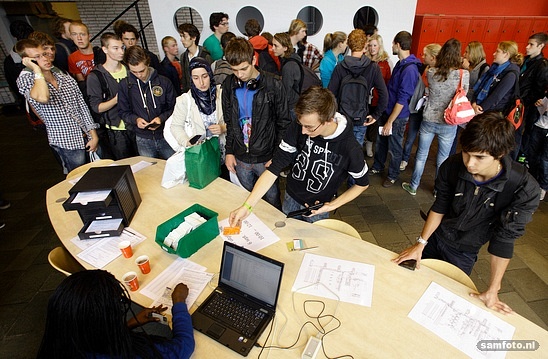Despite TU Delft’s best efforts to promote openness and tolerance on campus, religion remains a sensitive topic within the university community.
As a progressive educational institution, TU Delft strives to safeguard each person’s right to freedom of expression. Nevertheless, the question remains whether the university is an appropriate venue for expressing religious views. While some members of the community agree that discussions on religion are part and parcel of academia, others maintain that the TU Delft, particularly its faculty members, should remain neutral if they are to adhere to the university’s mission of conducting groundbreaking scientific and technological research.
One such instance that highlighted this dispute was a Christian advertisement published in Delta. In September 2014, a group of Christian faculty members took out an ad in the magazine with the message, “Christian Scientists at TU Delft welcome all new students to our university!” The ad was meant as an open invitation to new students to discuss their thoughts on life’s big questions, on God and the meaning of everything. Despite its good intentions, the message was ill received by some people, who claimed that religious beliefs have no place in an academic environment.
“What if you are a convinced Jew, Muslim, atheist or even a non-practicing Christian, is this message honestly meant for you as well – will you also be able to turn to this self-satisfied pious club?” asked PhD student Bojk Berghuis in an open letter to Delta. According to Berghuis, the underlying message of the ad is that this group of Christian scientists have chosen the “Good Path” and should be regarded as being right, given their knowledge and positions in the scientific community. “I think this is a very unfortunate signal,” Berghuis claimed. “I thought by now we were past the days of sectarianism.” Although the PhD student maintains that the university is in fact a place to reflect on the larger questions in life, he is convinced that students should find the answers themselves, without the involvement of these so-called “pious professors”.
“It’s strange to me that this letter became a controversial subject,” said Professor Yuli Nazarov. “I was surprised by how people of his [Berghuis’] generation react to such things. His reaction looked a bit dogmatic to me.” As one of the Christian scientists who signed the advertisement, Nazarov believes that >> people can have different opinions when it comes to religion. “A main advantage of Western civilization is pluralism, to allow for multiple opinions,” Nazarov explained. “Now it seems that tolerance is slowly vanishing from our society.”
Another signatory of the advertisement, Associate Professor Henk Polinder, shares Nazarov’s view that university education should be universal and that coming into contact with different points of view is an integral part of studying at TU Delft. “We are not formally a secular university. We are a public university,” said Polinder. “I think it’s good that students are aware that different professors have different opinions and that it’s acceptable to be a Christian and not to be a Christian. That’s how a public university works.” That being said, Polinder stands by the advertisement, which has been published in Delta for the last four years. “If we act as if religion and everything related to that is private, and we don’t talk about it at the university, we kind of promote a world view in which religion is irrelevant. And that is not my world view.”
If the subject of religion is to be discussed at TU Delft, a number of people maintain that it must be in the form of an open conversation, including all points of view, instead of a heated debate. “If we could encourage people to be more open and integrated, and share each other’s cultures more, that would be ideal,” said Leroy Oostenbrink, Chairman of student association VOX Delft. “Religion is only one part of people’s culture and you can’t be divorced from your culture. The mere fact that TU Delft is an international university and includes so many different cultural perspectives means we have to at least acknowledge that it exists and not discourage its existence.”
Indeed, internationalization has become a top priority at TU Delft. To foster this global mindset, openness and cultural understanding within the university community plays a significant role. “I think inter-religious dialogue is something very important in order to promote a global world,” said Samet Agca, Chairperson of Turkish student association SV Hezarfen. “The world is turning more and more into a global village and I think allowing this discussion on campus would permit this global village to actually take shape.”
In an effort to encourage students to think about their worldview, a number of TU Delft organizations plan to organize a series of discussions over the next few months on relevant topics such as religion and cultural diversity. Studium Generale, for example, intends to explore whether discussions on religion and worldview fit into a person’s existence as a student, an academic or an engineer. Entitled “Missing the big picture?” the event series aims to bring together speakers from different cultural and professional backgrounds to discuss their experiences and points of view. Moreover, SV Hezarfen seeks to bring about more awareness of the global mindset and cultural diversity by examining the ideal citizen of the globalized world.
“To me it’s always the right time to talk about religion,” said Klaas van der Tempel, Program Manager at Studium Generale, “which is why I want people to think about it for themselves.”



Comments are closed.